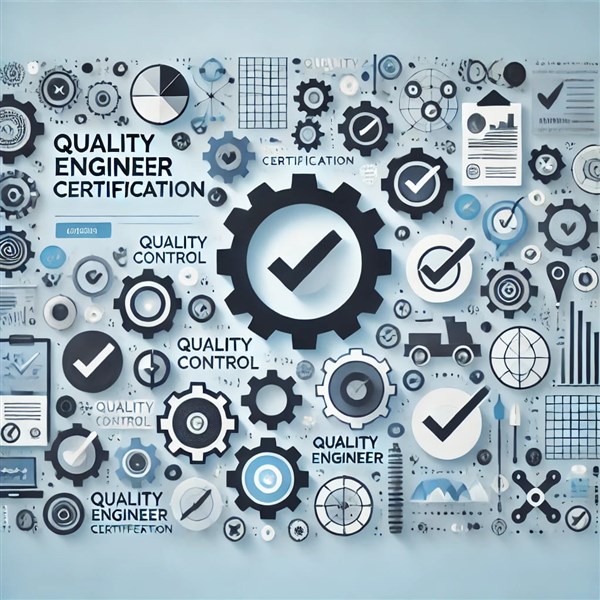
In the ever-evolving world of technology, staying ahead of the curve is crucial. One way to stay relevant and competitive in your field is through continuous learning and certification. In the realm of quality engineering, this couldn't be truer. Professionals seeking to upskill, validate their knowledge, and increase their marketability should consider quality engineering certifications.
In today’s competitive job market, having the right qualifications can significantly influence your career trajectory. For quality engineers, obtaining a quality engineer certification is not just an additional credential; it can be a game-changer in terms of job opportunities, career advancement, and professional credibility. This blog explores why quality engineer certifications matter, the various certifications available, and how they can impact your career.
Understanding Quality Engineering
Before diving into the specifics of certification, it’s essential to understand what quality engineering entails. Quality engineers play a crucial role in ensuring that products and services meet specific standards of quality. They are responsible for developing quality control processes, conducting audits, and implementing improvements based on statistical analysis. Their work spans various industries, including manufacturing, healthcare, software development, and more.
The Importance of Quality Engineering
Quality engineering is vital for several reasons:
- Customer Satisfaction: High-quality products and services lead to higher customer satisfaction, which is essential for brand loyalty and business success.
- Cost Reduction: Effective quality control can significantly reduce waste and rework, ultimately leading to cost savings for the organization.
- Regulatory Compliance: Many industries are subject to regulations and standards. Quality engineers help organizations comply with these requirements, avoiding potential legal issues.
- Continuous Improvement: Quality engineers play a pivotal role in the continuous improvement process, helping organizations to adopt practices like Six Sigma and Lean Manufacturing.
The Role of Certification in Quality Engineering
1. Demonstrates Expertise and Knowledge
Obtaining a quality engineer certification demonstrates your expertise in the field. It indicates that you have a solid understanding of quality principles, tools, and methodologies. This is particularly important in industries where precision and adherence to standards are crucial. Certifications validate your knowledge and show employers that you are committed to maintaining high standards in your work.
2. Enhances Career Opportunities
The job market for quality engineers is competitive. Certifications can set you apart from other candidates, making you more attractive to potential employers. Many organizations prefer or even require certifications when hiring quality engineers, especially for roles with significant responsibility. Holding a certification can give you a competitive edge and open doors to new job opportunities.
3. Supports Career Advancement
For quality engineers looking to advance their careers, certifications can play a pivotal role. Many companies have structured career paths that require employees to obtain specific certifications before being considered for promotions. By obtaining certifications, you demonstrate your commitment to professional development and your readiness for more advanced roles.
4. Boosts Earning Potential
Earning potential is often tied to qualifications. Quality engineers with certifications typically command higher salaries than those without. According to various salary surveys, certified quality engineers can earn significantly more, reflecting the value that organizations place on certified professionals. Investing time and resources into obtaining a certification can lead to substantial financial returns over time.
5. Network Building Opportunities
Pursuing quality engineer certifications often opens up networking opportunities. Many certification programs have associated professional organizations or communities where you can connect with other quality professionals. Building a professional network can provide access to job opportunities, mentorship, and knowledge-sharing, which can further enhance your career prospects.
6. Staying Current with Industry Standards
Quality engineering is a field that is continuously evolving. New technologies, methodologies, and standards emerge regularly. Certification programs often require ongoing education to maintain your credentials, ensuring that you stay current with industry trends and best practices. This commitment to lifelong learning not only enhances your skills but also demonstrates to employers that you are proactive about your professional development.
Popular Quality Engineer Certifications
Several certifications are highly regarded in the field of quality engineering. Here are a few of the most recognized options:
1. Certified Quality Engineer (CQE)
Offered by the American Society for Quality (ASQ), the CQE certification validates your knowledge and skills in quality engineering. The certification covers topics such as quality control, process improvement, and statistical analysis. CQEs are trained to identify and solve quality-related issues, making them valuable assets to their organizations.
2. Six Sigma Certification
Six Sigma is a data-driven approach to process improvement and quality management. Various organizations offer Six Sigma certifications, including ASQ and the International Association for Six Sigma Certification (IASSC). Six Sigma certifications range from Yellow Belt (entry-level) to Black Belt (advanced), allowing professionals to choose a level that aligns with their experience and career goals.
3. Certified Quality Auditor (CQA)
Also offered by ASQ, the CQA certification focuses on the principles and practices of auditing. It is ideal for quality professionals involved in audit processes and those seeking to enhance their knowledge of quality systems. The certification demonstrates your ability to assess compliance with established standards and regulations.
4. ISO 9001 Lead Auditor Certification
ISO 9001 is a globally recognized quality management standard. The Lead Auditor certification prepares professionals to conduct audits of organizations’ quality management systems. This certification is highly valued in industries that adhere to ISO standards, and it enhances your credibility as a quality professional.
5. Lean Certification
Lean principles focus on maximizing value while minimizing waste. Lean certifications, offered by various organizations, validate your understanding of Lean methodologies and your ability to implement them in an organizational context. This certification is beneficial for quality engineers looking to drive efficiency and continuous improvement.
How to Choose the Right Certification
Selecting the right quality engineer certification depends on your career goals, current qualifications, and the industry in which you work. Here are some factors to consider:
- Career Goals: Identify your career aspirations and choose a certification that aligns with those goals. For example, if you aim to specialize in auditing, the CQA certification may be suitable.
- Industry Requirements: Research the certifications most valued in your industry. Certain certifications may be more recognized or required by employers in specific sectors.
- Level of Experience: Consider your current experience level. Some certifications are designed for entry-level professionals, while others require significant experience.
- Cost and Time Commitment: Evaluate the costs associated with certification, including exam fees and preparation materials. Also, consider the time required to study and prepare for the exam.
Conclusion
In the competitive landscape of quality engineering, obtaining a quality engineer certification is more than just a credential; it is a strategic investment in your career. Certifications not only validate your expertise but also enhance your job prospects, earning potential, and opportunities for career advancement.
By demonstrating your commitment to quality and continuous improvement, you position yourself as a valuable asset to employers, ultimately leading to a more fulfilling and successful career. Whether you are just starting your journey in quality engineering or looking to advance to the next level, pursuing a quality engineer certification can be a transformative step toward achieving your professional goals.
Koenig Solutions, a leading IT training company, offers a range of quality engineer training courses. These courses are designed to equip learners with the necessary skills and knowledge to pass the quality engineer certification exam and excel in their careers.
In conclusion, a quality engineer certification is not just a piece of paper. It's a powerful tool that can open up new opportunities, increase your earning potential, and set you apart in the competitive job market. So, why wait? Start your training for quality engineers today and take your career to the next level.







COMMENT